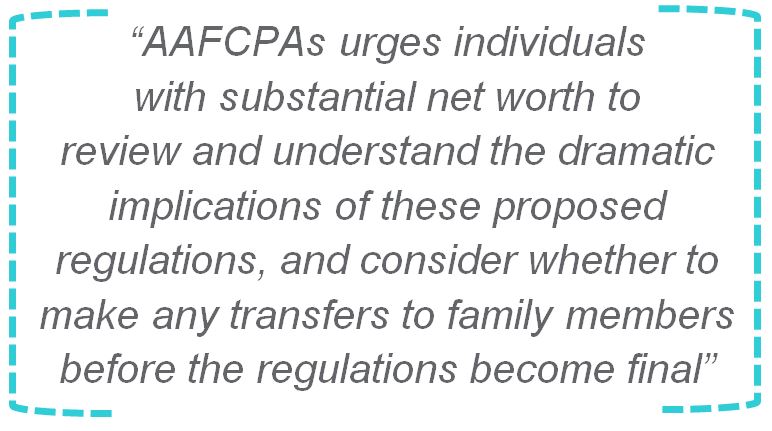IRS Section 2704 Proposed Regulations Could Eliminate Significant Estate Planning Technique for Family-Controlled Entities
The IRS has issued Proposed Regulations under Internal Revenue Code § 2704 that may dramatically reduce the ability to apply discounts in valuing the interests of many family-controlled entities for estate gift and generation skipping tax purposes. Specifically, the proposed regulations may significantly restrict the application of lack of control or marketability discounts in determining the fair market value of transferred interests.
AAFCPAs urges individuals with substantial net worth to review and understand the dramatic implications of these proposed regulations, and consider whether to make any transfers to family members before the regulations become final. Although the present Estate Tax exemption is $5,450,000, per person, this amount is subject to change based on the results of future Congressional and Presidential action. Should the exemption be lowered via future legislation, the impact of these proposals will affect a number of families whose estates are exempt under present law.
Background
 These proposed regulations have been widely anticipated. Section 2704 was enacted by Congress in 1990 in an effort to limit valuation discounts for gift and estate tax purposes. The IRS believes that the current regulations under IRC § 2704 have been made ineffective by changes in state laws, court decisions, and various estate planning techniques that avoid the application of § 2704(b). The IRS has tried to halt estate and gift discounts and has been fighting a losing battle since the enactment of IRC §§ 2701-2704.
These proposed regulations have been widely anticipated. Section 2704 was enacted by Congress in 1990 in an effort to limit valuation discounts for gift and estate tax purposes. The IRS believes that the current regulations under IRC § 2704 have been made ineffective by changes in state laws, court decisions, and various estate planning techniques that avoid the application of § 2704(b). The IRS has tried to halt estate and gift discounts and has been fighting a losing battle since the enactment of IRC §§ 2701-2704.
Section 2704(b)(4) provides that the IRS has the authority to provide in regulations that other restrictions may be disregarded “in determining the value of the transfer of any interest in a corporation or partnership to a member of the transferor’s family if such restriction has the effect of reducing the value of the transferred interest . . . but does not ultimately reduce the value of such interest to the transferee.” These Proposed Regulations use the authority granted under § 2704(b)(4) to implement the previous proposals that have up to this point gone unheeded.
When are Section 2704(b)(4) regulations effective?
The Proposed Regulations do not go into effect until after the regulations are finalized. Typically the process of finalizing regulations can take several years. However, if the IRS prioritizes the process it could be completed by the second quarter of 2017. A hearing on the Proposed Regulations is scheduled for December 1, 2016.
There is some question whether the Proposed Regulations exceed the regulatory authority of the IRS, and while they will most likely be challenged, that will be long after the regulations have been finalized.
What do we advise?
If the Proposed Regulations go into effect as written, they will have a dramatic impact on estate planning for owners of family controlled entities. They will effectively eliminate discounts for lack of control or marketability in valuing these interests. It may still be possible to make transfers before the Proposed Regulations become finalized and still apply valuation discounts. If the individual dies within three years of the transfer and after the Proposed Regulations are finalized, the transfer could still be caught by the final regulations.
If you own an interest in a family controlled entity, it is important to consider whether to make any transfers to family members before the regulations become final. Given the current large federal estate tax exemption of $5,450,000, the limited number of people actually subject to the federal estate tax, and the step-up in basis rules, many taxpayers might benefit from the inability to apply discounts. In other words, in the event that a taxpayer passes away holding these family controlled entities, which then get passed on to the next generation, a higher valuation may be desirable to get the larger step-up in basis, assuming there is no estate tax due.
For further information or guidance, please contact your AAFCPA partner or Joshua S. England, Esq, at 774.512.4109, jengland@nullaafcpa.com.

